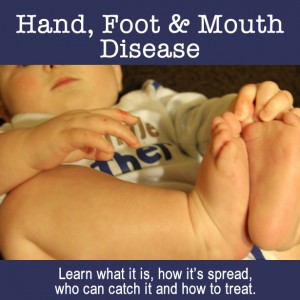 Hand, foot, and mouth disease, or HFMD, is a virus commonly occurring in children under the age of 5. It can sometimes affect adults who can also be asymptomatic carriers of the disease without realizing they are infected. This virus is not to be confused with foot-and-mouth disease (also known as hoof-and-mouth disease), which affects animals. HFMD is caused by the Enterovirus group of viruses and happens especially in areas with high concentrations of children, like daycare centers or preschools. It is most common in the summer and fall seasons but can happen anytime throughout the year.
Hand, foot, and mouth disease, or HFMD, is a virus commonly occurring in children under the age of 5. It can sometimes affect adults who can also be asymptomatic carriers of the disease without realizing they are infected. This virus is not to be confused with foot-and-mouth disease (also known as hoof-and-mouth disease), which affects animals. HFMD is caused by the Enterovirus group of viruses and happens especially in areas with high concentrations of children, like daycare centers or preschools. It is most common in the summer and fall seasons but can happen anytime throughout the year.
Hand, foot, and mouth disease is extremely contagious and is easily spread through contact with an infected person’s secretions, fluids, or stool. For example, if an infected individual coughs or laughs, a person nearby could breathe in those droplets and become infected. It is important if you know someone is infected to disinfect any shared or common areas, surfaces, and objects. Ideally, the contagious person would be isolated to reduce exposure to healthy people.
At first, the person who is infected may know he doesn’t feel good, but may not be able to put a finger on exactly what is wrong. This is referred to as malaise. He may have a fever and a sore throat. After a few days, mouth sores generally appear.
Symptoms of hand, foot, and mouth disease include:
- Fever
- Irritable disposition
- Loss of appetite
- Sore throat
- Mouth sores or ulcers that may interfere with eating and drinking
- Rash with blisters or red spots on palms of hands, soles of feet, and other areas of the body
Is there a treatment for hand, foot, and mouth disease?
Generally, hand, foot, and mouth disease is self-limiting and will resolve within a week. There are no medications that specifically target this disease. If you or your child is afflicted, speak with your doctor to determine what over-the-counter medications may be appropriate to relieve pain and discomfort. It’s important for infected persons to rest and stay hydrated, though this may be a challenge if they have painful mouth sores. Complications of hand, foot, and mouth disease are extremely rare but include viral meningitis and inflammation in the brain.
There is no vaccine that protects against hand, foot, and mouth disease. The best method of prevention is hand hygiene. Wash hands frequently with soap and water and teach children to wash their hands often. Remind children that putting their hands and objects in their mouth can cause sickness. Avoid contact with known infected individuals and if you or your child become sick and you have any questions, make an appointment to see the staff at Urgent Care. We’ll take a look at your symptoms and see what we can recommend to get you feeling better.
